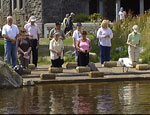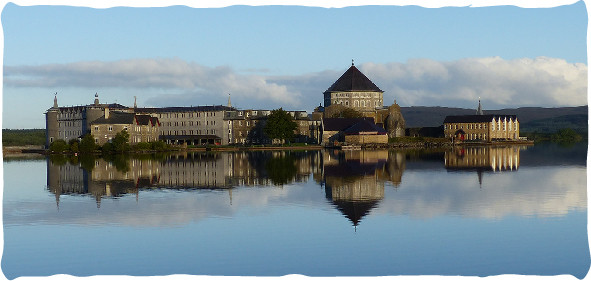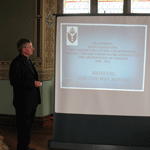Full details can be found directly on the Lough Derg website, www.loughderg.org
PILGRIMAGE AND RETREATS

Come as you are, friend or stranger, young or old, searching or at peace, in joy or in sadness; come to the sanctuary of St Patrick, a shrine of prayer and deep awakening to the presence of God.
Stories about Lough Derg and the legendary pilgrimage have spanned the centuries and as far back as records go, have been associated with St Patrick. To come on pilgrimage to Lough Derg, for one day or three days, one walks in the spiritual footsteps of St Patrick. Today, pilgrims young and old walk side by side in this place apart – a meeting place where God’s healing grace is experienced in an intensity seldom encountered elsewhere, through the spiritual programmes, the companionship of fellow pilgrims and the sheer holiness of the Island.
For over a thousand years pilgrims are coming to Lough Derg. Taking time away from everyday life offers the space to look at the past with understanding, make sense of the present and look to the shores of new possibilities.
Lough Derg is a place of welcome where no one is judged and everyone is equal. It is a holy place of deep pastoral care for all those who make the journey – just as they are.
Every season (May, June, July, August, September) there are a number of retreat opportunities – ‘day away’ retreat options as well as the traditional Three Day Pilgrimage, details below.
Lough Derg will reopen for the 2016 Season as follows; One Day Retreats will commence on May 1st and continue on 2, 7, 8, 10, 14, 15, 17, 21, 22, 23, 28, 29. The Three Day Pilgrimage commences on Wednesday 1st June 2016
THREE DAY PILGRIMAGE

The Three Day Pilgrimage follows the tradition of St Patrick.
It is a challenging journey through which to share the company of the Lord. A deeply powerful experience that requires endurance and an openness to enter into the spirit of the pilgrimage.
A practical guide to your pilgrimage
Coming on the three Day Pilgrimage the pilgrim agrees to undertake the pilgrimage programme of prayer and quiet reflection in bare feet, keeping Vigil and maintaining the Fast. Pilgrims must be able to walk and kneel unaided and free from any illness aggravated by fasting.
Please note it is not necessary to book in advance. You may simply arrive any day of the week (between 11.00am & 3.00pm) to commence pilgrimage. Admission is €70/£60. Student Discount 15%, concessions for Seniors & Groups.
Pilgrims usually arrive around mid-day on the first day and stay on the Island until the morning of the third day. Fasting begins at 12 midnight prior to arrival on the Island. The period of fasting (one simple Lough Derg meal each day) lasts until 12 midnight on the third day. The 24hr Vigil, where pilgrims journey together in watchful prayer, begins at 10.00pm on the first day of the pilgrimage and ends at 10.00pm on the second day. Liturgies and sacraments celebrated during the pilgrimage include Eucharist, Reconciliation and Way of the Cross as well as other communal times of prayer. Nine Station Prayers are completed over the three days. The first, second and third stations are made on the penitential Beds on Day One. Pilgrims make the fourth to seventh Stations together in St Patrick’s Basilica during the night Vigil. The eight Station is completed during the second day and the ninth Station before departure on the third day.
It is at the discretion of each individual pilgrim to use the sacred space and time on the second day to enter into a quiet reflective state. Exposition of the Blessed Sacrament, scripture reading resources, the labyrinth and the contemplative spaces offered in Davog House are available to aid the pilgrim.
ONE DAY RETREATS
The One Day Retreat offers a shorter retreat experience where shoes remain on and lunch is served.
One Day Retreats are held on the following days in May, late August and September.
May 1st 2016 and continue on 2, 7, 8, 10, 14, 15, 17, 21, 22, 23, 28, 29
Booking essential. Island Admission €40, concessions for Groups.
On arrival, there are light refreshments and an opportunity to meet with others. A set programme is offered which invites you to join in time-honoured prayer as well as allowing personal time for reflection.
The programme includes the Sacrament of Reconciliation and the Celebration of Eucharist. The day commences at 10.20am and concludes at approximately 4.30pm.
THEMED RETREAT DAYS
Experience the nurturing peace of Lough Derg. In the tranquil setting, tailored Retreat Days may offer encouragement, guidance, healing, hope, comfort and much more. To find out more about the individual themed retreat days; Family Day, Seniors Afternoon, Quiet Days, School Retreats and more go to http://booking.loughderg.org/
Individuals/groups may participate in self-directed retreats. Such retreats are at the discretion of the Prior and are only available outside the traditional Three Day Pilgrimage season. (end May until 15th August).
For more information on Lough Derg visit the website www.loughderg.org or email: [email protected] or phone 00353 (0) 71 9861518.





You must be logged in to post a comment.